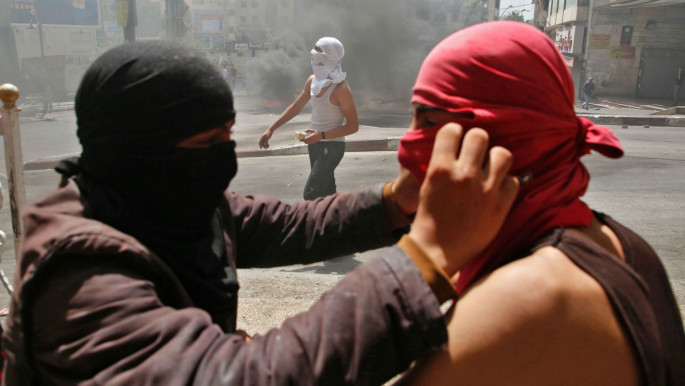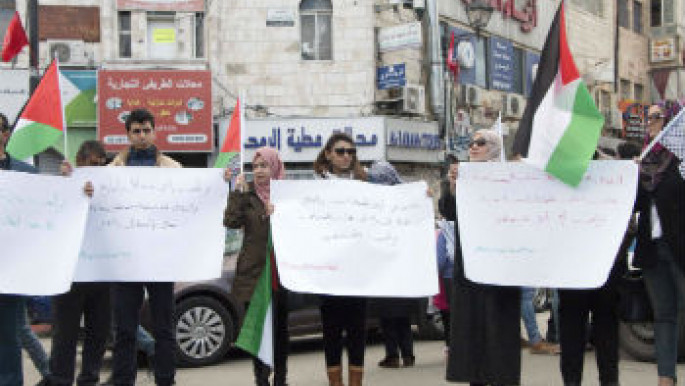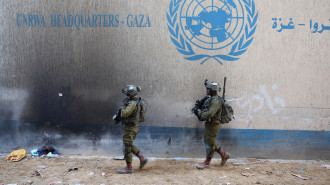Trump Jerusalem move fuels protest across occupied Palestinian territories
Palestinians watched in dismay as the US president made the announcement in a highly anticipated speech on Wednesday evening, when he also said he would start the process of moving the US embassy from Tel Aviv, refusing to renew a waiver on a law passed in 1995.
While Israel claims the whole of Jerusalem as its "undivided, eternal capital", Palestinians see the eastern sector of the city as the capital of their future state. The international community does not recognise Israel's annexation of East Jerusalem, and considers it occupied territory.
The US is the first country to recognise Jerusalem as Israel's capital, upending decades of US policy.
Most shops stayed shut in cities across the West Bank on Thursday as a general strike was declared. Busy shopping streets in Ramallah looked eerily quiet on Thursday morning, while the air was filled with slogans blasting from speakers set up at the back of a truck on Al Manara, the city's main square.
 |
We will tell our children Jerusalem is ours, nothing will change |  |
"Jerusalem is Palestinian, Trump has no right to say it is Israeli," Shaden Ramzi Obayda, a 16-year-old high school student, told The New Arab as the protest here got underway. "We will tell our children Jerusalem is ours, nothing will change," she added. She was one of a good number of Palestinian youth attending the protest, which saw a turnout of a few hundred people.
 |
|
| In pictures: Israeli troops attempt to suppress West Bank protests against Trump's Jerusalem move |
The Palestinian leadership announced three "days of rage" against Trump's move, set to begin on Wednesday night. After Trump's speech, Hamas leader Ismail Haniyeh called for ordinary people to join a new uprising against Israel.
While Gazans burned portraits of Trump in demonstrations on Wednesday night, West Bank cities under heavy rainfall remained largely quiet in the hours before the decision was made official.
On Thursday, however, it wasn't long before protests turned into clashes between Palestinian protesters and Israeli forces across the West Bank. In Ramallah, confrontations that started in the early afternoon had only subsided by nightfall at various friction points including the infamous DCO and Qalandiya military checkpoints, along access routes to the city.
A protest in Bethlehem was met with tear gas and rubber bullets as it approached the separation wall.
According to local media reports, at least fifty people were injured across the West Bank, including nine injuries from live fire.
"We came to free Jerusalem. How I'm going to bring it back? If we all go to Beit El [a radical settlement built on occupied land near Ramallah, home to 6,500 Israeli settlers] and throw rocks at Israel, we will take Palestine," said a particularly vocal member of a group of youth in their late teens.
And while not all Palestinians would agree, concerns of a new bout of violence in the occupied Palestinian territories were widespread on the eve of the 30th anniversary of the start of the first Palestinian Intifada, which officially began on December 8, 1987.
Izzat Zeidan, who was at the protest at Al Manara, believes that throwing stones and the tactics of the first intifada no longer work, but that Palestinians should take a stand against Trump's decision anyway.
"I feel it is my duty to stand against this decision, which takes away our rights and says that Israel's occupation is a legal one," he told The New Arab. "Jerusalem will stay our capital and not the Israeli capital," he added.
 |
I don't believe in a two-state solution. I think it's a game, it's just things that they say |  |
Saja Hazem, a 22-year-old teacher, said she'd stopped by the protest out of curiosity and to listen to what was being said. She told The New Arab that while she hadn't been following the issue, as soon as she learned what Trump had done she tuned in to the speech.
 |
|
| A high proportion of the hundreds who turned out were young people [Ylenia Gostoli] |
"What annoyed me most is that he kept saying 'Israel', but when it comes to Palestine he says 'the Palestinian people'. While saying he wants peace for all of us," she told The New Arab. She doesn't think anything will change because she doesn't believe in the peace process in the first place.
"I don't believe in a two-state solution," she said. "I think it's a game, it's just things that they say, but at the very end it won't be a two-state solution. It may be a one-state solution which is not us, or under another name maybe."
Khaled Diab is a 45-year-old physiotherapist. "People don't believe in the Palestinian Authority," he said. "They have become tired of the bad situation of the Palestinian people. I came anyway because I must do something.... This time we are accepting this decision or not accepting. I think it's a very difficult moment for the Palestinians. The Palestinian Authority must go home and the Oslo [agreement should] come to an end."
Ylenia Gostoli is an independent journalist based in Jerusalem. Her work was shortlisted for the Anna Lindh Mediterranean Journalist Award in 2014.
Follow her on Twitter @YleniaGostoli

![Palestinians mourned the victims of an Israeli strike on Deir al-Balah [Getty]](/sites/default/files/styles/image_684x385/public/2024-11/GettyImages-2182362043.jpg?h=199d8c1f&itok=xSHZFbmc)


![The law could be enforced against teachers without prior notice [Getty]](/sites/default/files/styles/image_684x385/public/2178740715.jpeg?h=a5f2f23a&itok=hnqrCS4x)
 Follow the Middle East's top stories in English at The New Arab on Google News
Follow the Middle East's top stories in English at The New Arab on Google News


